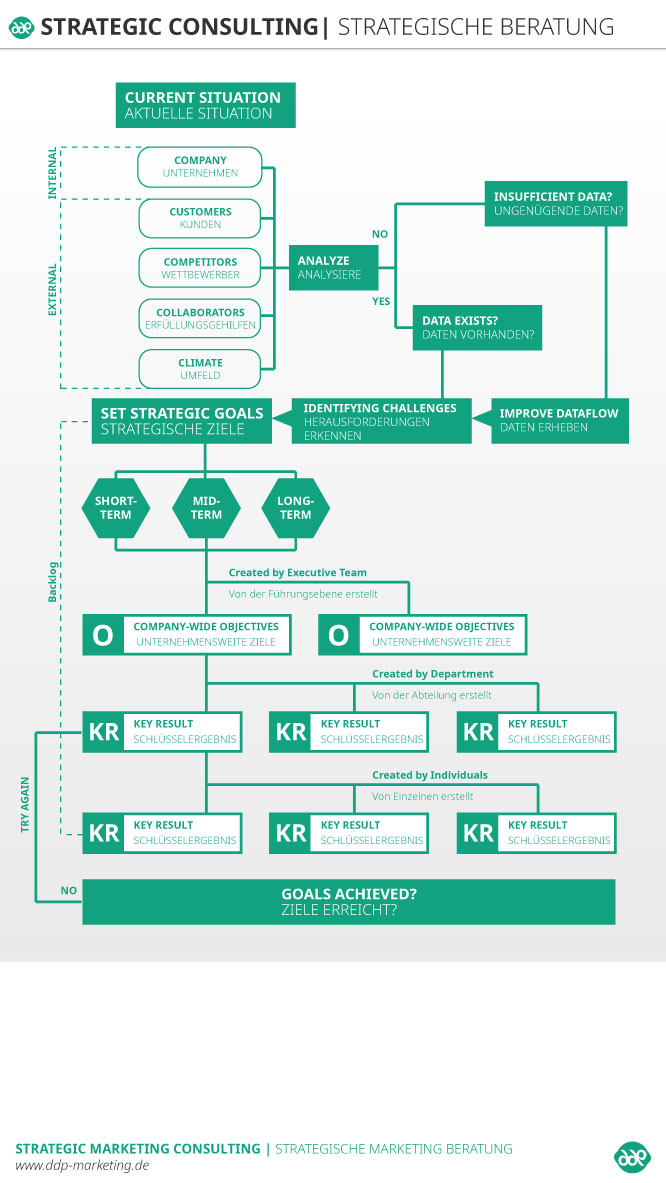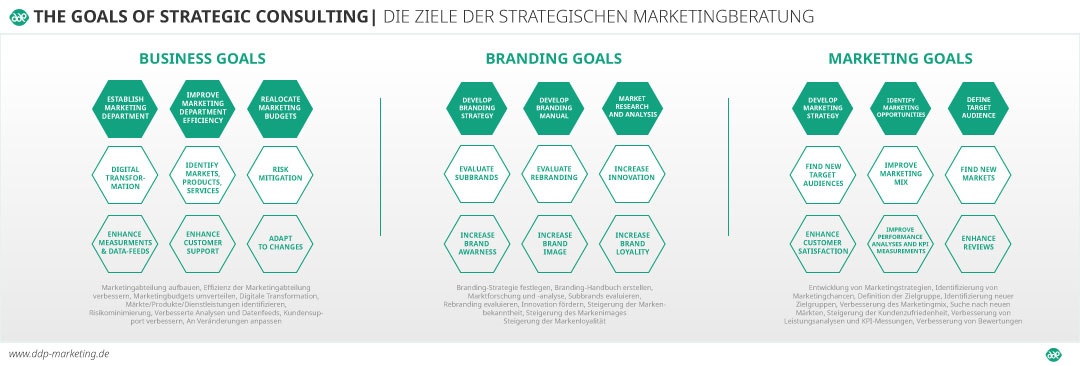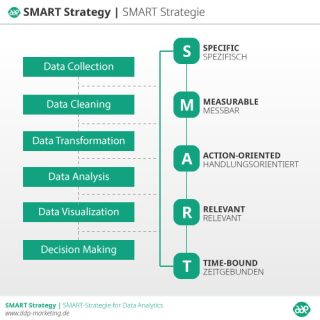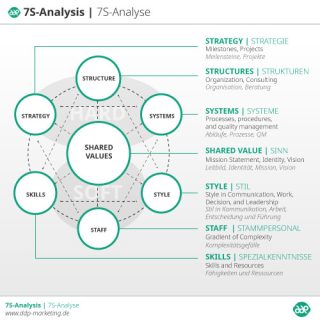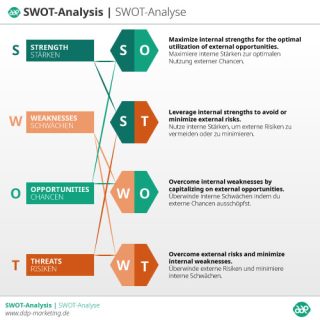Strategic
Marketing
Consulting

STRATEGIC CONSULTING IN MARKETING
Effective Paths to Transformation
The current geo-political landscape, coupled with dynamic shifts in the energy sector, alongside economic changes such as skilled labor shortages, digitalization, and artificial intelligence, are not only influencing the contours of politics and society but are also thrusting companies into significant and unparalleled challenges as they contemplate and ensure their future.
- Introduction
- What is strategic marketing consulting?
- Understanding the role of strategic marketing consulting
- Challenges in strategic marketing
- Adapting to rapid changes in the business environment
- Harnessing the power of strategic marketing amidst uncertainties
- The advantages of experienced marketing consultants for rapid transformations
- Strategic Analyses for Effective Marketing
- Overview of Analysis Methods and Statistics
Introduction
Strategic marketing consultation has emerged as a collaborative leadership endeavor, focusing on developing comprehensive strategies for organizational growth and resilience. This subpage delves into the intricacies of systemic strategic consulting, distinguishing it from expert-centric approaches, and highlights the pivotal role it plays in addressing evolving challenges.
The role of strategic marketing consulting
We shed light on the role of strategic marketing consulting in shaping long-term success strategies that go beyond short-term tactics. The focus is on aligning with the core goals and values of the company.
The role of strategic marketing consulting extends far beyond the traditional concept of marketing and acts as a crucial architect for corporate success. This form of consultancy plays a key role in bridging the gap between a company’s overall strategy and its marketing efforts. With a deep understanding of the target audience, market dynamics, and competitive landscape, strategic marketing consulting becomes a catalyst for shaping a unique brand profile. It serves as a guide, considering not only current market conditions but also acting proactively to support the long-term goals of a company. In this sense, strategic marketing consulting is the conductor in the orchestra of marketing, coordinating various elements to create a cohesive and effective melody for success. Its role goes beyond tactics and becomes an integrative part of corporate leadership, contributing to shaping the big picture and establishing a sustainable competitive position.
Challenges in strategic marketing
A look at the challenges faced by companies in strategic marketing provides a deeper understanding of the need for professional consulting. We discuss possible hurdles and how they can be successfully overcome.
Embarking on strategic marketing comes with its share of challenges. The evolving landscape of consumer behavior, intense competition, and resource allocation complexities are key hurdles. Understanding and predicting changing consumer preferences pose intricate tasks, while standing out amid competitors requires a delicate balance between differentiation and a compelling brand identity. Allocating resources across various channels, especially with the dynamic digital landscape, demands a nimble approach. Measuring the effectiveness of strategies, identifying suitable KPIs, and ensuring consistency across diverse marketing initiatives add further layers of complexity. Navigating these challenges requires strategic foresight, adaptability, and a deep understanding of market dynamics and brand intricacies. Success hinges on an ongoing process of refinement and innovation in response to the ever-evolving marketing landscape.
Adapting to rapid changes in the business environment
The dynamics of today’s business environment require continuous adaptation of strategies. Here, we show how strategic marketing consulting can help flexibly respond to changes and seize opportunities.
Adapting swiftly to changes is vital for strategic marketing. Staying competitive means keeping up with technological advancements and adjusting marketing strategies based on real-time insights into evolving consumer preferences. External factors, like economic shifts, add complexity. Proactive responses help mitigate risks and capitalize on opportunities. In the digital realm, continuous innovation is key. Reshaping marketing strategies and exploring new markets are necessary for staying competitive. Adaptability is a strategic advantage, allowing businesses to pivot and embrace new technologies for survival and success in a changing business environment.
Harnessing the power of strategic marketing amidst uncertainties
We discuss how strategic marketing can strengthen companies during uncertain times by providing clear perspectives, action plans, and risk management strategies.
In the face of uncertainties, strategic marketing emerges as a powerful tool for businesses to navigate and thrive. Rather than viewing uncertainties as obstacles, strategic marketing leverages them as opportunities for innovation and differentiation. It involves a proactive approach to anticipating changes in the business landscape, understanding shifting consumer behaviors, and recalibrating strategies accordingly. Embracing flexibility and adaptability, strategic marketing enables businesses to pivot swiftly in response to unexpected challenges or emerging trends. Moreover, it emphasizes the importance of data-driven decision-making, allowing companies to glean insights in real-time and make informed adjustments to their marketing initiatives. By harnessing the power of strategic marketing amidst uncertainties, businesses can transform unpredictability into a strategic advantage, positioning themselves to not only weather uncertainties but also capitalize on them for sustainable growth.
The advantages of experienced marketing consultants for rapid transformations
Experienced marketing consultants bring not only expertise but also an external perspective. We explore how they support companies in undergoing effective transformation processes.
Experienced marketing consultants are invaluable assets for businesses undergoing rapid transformations. Drawing on diverse industry experiences, they offer strategic insights, anticipating challenges and devising tailored solutions. Their ability to align marketing strategies with broader transformation goals accelerates the process, ensuring efficiency. With a keen focus on data-driven decision-making, these consultants enable businesses to adapt swiftly to market trends and capitalize on emerging opportunities. Beyond immediate benefits, their collaboration facilitates knowledge transfer, empowering internal teams to sustain the momentum of rapid transformations, ultimately positioning the business for sustained success in dynamic environments.
FREE DOWNLOAD
Explore how to manage uncertainties and shape your future sustainably.
Download our newest Whitepaper about “INNOVATIVE CONSULTING SOLUTIONS FOR BUSINESS GROWTH”

Strategic Analyses for Effective Marketing
The fast-paced nature of today’s business world requires a proactive approach to strategic marketing. We’ll explore how strategic consultation helps organizations anticipate, adapt to, and capitalize on current events. From global economic shifts to industry-specific disruptions, businesses can leverage strategic marketing to not only weather the storm but also identify new opportunities for growth.
Company evaluation and 7S analysis
The 7S framework, developed by McKinsey & Company, examines seven interrelated elements within a company: strategy, structure, systems, skills, style, staff, and shared values. This analysis delves into how these elements align and interact, providing insights into the organization’s overall effectiveness. It’s not merely a checklist but a holistic approach that considers the interdependencies among various aspects of the company. By evaluating these dimensions, businesses can uncover areas for improvement, identify strengths to leverage, and ensure coherence in their strategic direction. This analytical tool becomes a roadmap for strategic decision-making, guiding companies towards optimal alignment and effectiveness across all facets of their operations.
Target audience analysis
The importance of a precise target audience analysis is highlighted, including considerations for aesthetic and linguistic preferences of the target audience.
A precise target audience analysis stands as a cornerstone in crafting effective marketing strategies. Understanding the demographics, psychographics, and behaviors of the target audience is paramount for tailoring messages that resonate. Beyond demographic data, delving into aesthetic and linguistic preferences adds another layer of nuance. Recognizing the visual and communication styles that appeal to the target audience ensures that marketing efforts are not only relevant but also engaging. This level of insight allows businesses to create a more personalized and impactful connection with their audience, fostering a sense of resonance that goes beyond mere demographic categorization. In essence, a thorough target audience analysis sharpens the focus of marketing initiatives, enhancing their effectiveness and fostering a deeper connection with the intended demographic.
Competitor analysis
An in-depth examination of the competitive landscape, including the analysis of competitors’ marketing and SEO strategies, reveals ways to differentiate and position oneself.
Competitor analysis serves as a strategic compass for businesses navigating the competitive landscape. Going beyond a surface-level assessment, an in-depth examination involves scrutinizing competitors’ marketing and SEO strategies. By dissecting their approaches, strengths, and weaknesses, businesses can uncover valuable insights. This analysis becomes a blueprint for differentiation and strategic positioning. Understanding what sets competitors apart allows for the identification of unique value propositions and areas where a business can excel. It’s not merely about mirroring strategies but about leveraging a nuanced understanding of the market to carve out a distinctive and competitive advantage. In essence, competitor analysis is a proactive tool that empowers businesses to navigate the competitive terrain with agility and foresight.
Development of a sustainable
marketing strategy
Insights into how companies can develop a long-term, sustainable marketing strategy that adapts to changing requirements.
Developing a sustainable marketing strategy is crucial for companies looking to thrive in dynamic environments. This involves cultivating a forward-thinking approach that adapts to changing requirements. Firstly, companies need to conduct a thorough analysis of market trends, consumer behaviors, and industry dynamics to gain actionable insights. Understanding the evolving needs of the target audience is essential for crafting a strategy that remains relevant over the long term.
A sustainable marketing strategy also requires a commitment to innovation and flexibility. Companies should be open to adopting emerging technologies, exploring new channels, and experimenting with creative approaches to stay ahead of the curve. Embracing a culture of continuous learning and adaptation enables businesses to respond effectively to shifts in the competitive landscape.
Furthermore, sustainability involves aligning marketing efforts with the company’s broader goals and values. Integrating environmental, social, and governance (ESG) principles into marketing strategies not only contributes to corporate responsibility but also resonates with an increasingly conscious consumer base.
Regular performance monitoring and data-driven decision-making are integral to the sustainability of a marketing strategy. Companies should leverage analytics to measure the effectiveness of their initiatives, identify areas for improvement, and make informed adjustments in real-time.
In essence, a sustainable marketing strategy is a dynamic and adaptive framework that considers long-term goals, embraces innovation, aligns with corporate values, and responds adeptly to the ever-changing business landscape. By incorporating these elements, companies can position themselves for enduring success in an evolving market.
Needs and risk analysis of marketing technology usage
An examination of the requirements for marketing technologies, coupled with a risk analysis, provides guidance in selecting and implementing marketing tools.
A comprehensive needs and risk analysis for the implementation of marketing technologies is crucial for businesses looking to effectively leverage these tools. The initial step involves understanding the specific requirements of the marketing function, encompassing campaign complexity, data management, and scalability.
In the risk analysis, special consideration should be given to data privacy and ownership. It is essential to identify potential challenges such as data privacy concerns, integration complexities, or the risk of technology obsolescence. Recognizing these risks enables companies to develop mitigation strategies and contingency plans.
Exemplary marketing technologies, including CRM, workflow management, marketing automation, generative AI, SEO analysis, tracking, social media management platforms, newsletter management, surveys, ad servers, and others, should be incorporated into the analysis. The consideration of cost aspects is equally crucial.
Insights gained from this dual analysis guide the selection and implementation of marketing tools. By aligning technological solutions with identified needs, proactively addressing potential risks, and considering cost aspects, companies can ensure a smoother integration and maximize the benefits of marketing technologies. This strategic approach not only enhances operational efficiency but also contributes to the overall success of marketing initiatives in a technology-driven landscape.
Analysis Methods and Statistics
Data Analytics for Targeted Insights
The era of big data calls for advanced data analytics techniques. This subsection investigates how organizations can leverage data analytics to derive targeted insights using the SMART criteria. From conducting Specific customer behavior analysis to Measurable predictive modeling, organizations can set Achievable goals for refining their strategies, optimizing marketing channels, and enhancing overall decision-making. Additionally, incorporating Relevant data points ensures that insights align with business objectives, while Time-bound analysis enables timely adjustments to maximize the impact of data-driven strategies.
The 7S analysis
The 7S framework comprises Strategy, Structure, Systems, Shared Values, Skills, Style, and Staff. Each “S” represents a key facet of organizational functioning, and collectively, they provide a holistic view of the internal workings of a company.
The primary advantage of the 7S Analysis lies in its ability to identify misalignments or gaps among these elements, offering valuable insights for strategic planning and organizational development. By examining how these components interconnect and influence each other, businesses can gain a deeper understanding of their internal dynamics. This, in turn, facilitates informed decision-making, effective change management, and the establishment of a cohesive organizational culture. Ultimately, the 7S Analysis serves as a powerful diagnostic tool, guiding organizations towards strategic alignment, improved performance, and long-term success.
SWOT Analysis
SWOT analysis remains a cornerstone in strategic marketing. This subsection delves into the Strengths, Weaknesses, Opportunities, and Threats framework, showcasing how organizations can use this method to assess internal and external factors. By identifying key elements impacting the business, companies can align their strategies with a clearer understanding of their competitive landscape.
Market Research and Surveys
In-depth market research and surveys are invaluable tools for gathering qualitative and quantitative data. This part explores the role of surveys and market research in strategic marketing, emphasizing their capacity to uncover customer preferences, market trends, and potential areas for innovation. By incorporating insights from these methodologies, organizations can make informed decisions tailored to their audience.
Utilization of existing Marekting experienceS
In our strategic marketing consultancy, we recognize the significance of learning from the past, particularly by evaluating previous campaigns. Through meticulous analysis and assessment of past marketing endeavors, we extract invaluable insights that go beyond mere performance metrics. By delving into the nuances of each campaign’s success factors and identifying areas for improvement, we lay the foundation for a comprehensive guideline. This guideline serves as a strategic compass, providing actionable recommendations and best practices derived from the real-world outcomes of previous initiatives. In essence, our approach involves turning the wealth of historical campaign data into a practical roadmap for future endeavors. This iterative process not only enhances the efficiency of future campaigns but also ensures a dynamic and adaptable marketing strategy that evolves with the changing landscape of the market.
Audits with Sales & Marketing employees
By conducting audits with key stakeholders, including sales and marketing teams, we ensure a comprehensive understanding of past strategies, successes, and challenges.
This valuable information is not merely archived but strategically compiled and made future-ready. Through the creation of knowledge databases and similar resources, we transform historical experiences into actionable insights for the future. This proactive approach ensures that the lessons learned from past endeavors become instrumental in shaping innovative marketing strategies, fostering continuous improvement, and positioning businesses for sustained growth in an ever-evolving market environment.
Definition of Key Performance Indicators (KPIs) for measurement
Measuring the success of a marketing strategy requires well-defined Key Performance Indicators (KPIs). This part elucidates the importance of selecting relevant KPIs and establishing benchmarks for measurement. By monitoring KPIs, organizations can gauge the effectiveness of their strategies, identify areas for improvement, and adapt to evolving market dynamics.
In the context of strategic marketing consulting, the definition of Key Performance Indicators (KPIs) for measurement involves a multifaceted approach, incorporating various analytical tools to gauge and enhance marketing strategies. Utilizing line charts, bar charts, and pie charts, website traffic patterns are visually assessed, offering insights into peak times and demographic trends. The marketing calendar is strategically visualized to optimize releases, synchronize offers, and measure traffic, emphasizing the bundling of impactful channels for conversions through marketing automation.
Furthermore, the tracking of conversion rates across social media, email, and advertisements is accomplished through the use of bar and line charts, while customer acquisition costs (CAC) trends are represented over time in segmented stacked bar charts. Return on Investment (ROI) is visualized through comparative bar charts and waterfall diagrams, providing a comprehensive overview of campaign success. Lead generation sources, social media engagement, and email marketing performance are all scrutinized using various charts, contributing to a holistic understanding of marketing effectiveness.
Moreover, the analysis extends to customer-centric metrics such as Customer Lifetime Value (CLV) and revenue trends, visualized through combinations of line charts and bar charts. The visualization of the marketing funnel, employing funnel diagrams, aids in comprehending conversion rates at each stage. Finally, the creation of target audience personas, informed by publicly available data and strategic scraping, aligns seamlessly with strategic marketing consulting practices, offering valuable insights for identifying trends, optimizing products, and making decisions related to visual branding.
Market Segmentation Analysis
Understanding diverse market segments is crucial for crafting tailored marketing strategies. This section explores market segmentation analysis, outlining how organizations can categorize their audience based on demographics, behaviors, and psychographics. By honing in on specific segments, businesses can create targeted campaigns that resonate with the unique needs and preferences of each group.
Trend Analysis and Forecasting
Staying ahead of industry trends requires adept trend analysis and forecasting. This subsection discusses how organizations can anticipate shifts in the market, emerging technologies, and consumer preferences. By incorporating trend analysis into their strategic marketing approach, businesses can position themselves as innovators and proactively adapt to changing market dynamics.
conclusion
In conclusion, effective strategic marketing involves a comprehensive understanding of current events, targeted audience insights, competitor landscapes, and the utilization of robust analysis methods. Stay tuned for the final part, where we wrap up the discussion and highlight the overarching benefits of strategic marketing consultation in navigating the complexities of today’s business environment.
FREE VIDEO
Unlock Success: Dive into the World of Strategic Marketing Consulting! 🚀 Explore How I Transform Businesses through Powerful Strategies. Don’t Miss Out – Your Next Level Awaits! Click to Uncover Marketing Brilliance. 💡#StrategicConsulting

